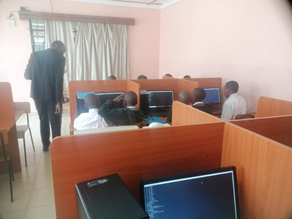AI and the Future of Healthcare: Revolutionizing Drug Discovery and Disease Management
AI and the Future of Healthcare: Revolutionizing Drug Discovery and Disease Management
|
T |
he integration of artificial
intelligence (AI) in healthcare is transforming how we understand, diagnose,
and treat diseases. Robotech Digital Solution's AI and Bionics Team is at the
forefront of this revolution, exploring innovative ways to harness AI for drug
discovery, personalized medicine, and disease management. This blog delves into
the intricate processes involved in curing strange diseases, the future of AI
in healthcare, and its broader societal impacts.
The
Process of Developing a Cure for a Strange Disease
Developing a cure for an unfamiliar
disease, such as a novel virus or bacteria, is a multi-step process. Here’s a
breakdown:
Detection and Identification:
- Pathogen identification is the first step, where
advanced diagnostic tools like genetic sequencing help scientists
understand the pathogen’s structure and behavior.
- Research and Analysis:
- Researchers study the pathogen’s interaction with the
human body to pinpoint its weaknesses.
- Drug Discovery:
- AI models analyze vast molecular datasets to predict
effective drug candidates. This step often involves repurposing existing
drugs or designing new compounds.
- Preclinical Testing:
- Potential treatments are tested in laboratory
settings, including cell cultures and animal models, to ensure safety and
efficacy.
- Clinical Trials:
- Rigorous human trials evaluate the drug’s safety,
optimal dosage, and effectiveness.
- Regulatory Approval and Distribution:
- Approval from regulatory bodies like the FDA or WHO
ensures the drug meets safety standards before mass production and
distribution.
AI
in Drug Development and Disease Cure
Artificial intelligence has become a
game-changer in drug discovery and disease management. Here’s how:
- Accelerated Drug Discovery: AI shortens the drug development timeline by analyzing
extensive datasets to identify promising drug candidates efficiently.
- Personalized Medicine: AI tailors treatments to individual patients based on
their genetic profiles, lifestyles, and environmental factors.
- Predictive Analysis:
By analyzing historical and real-time data, AI predicts disease outbreaks
and aids in early containment strategies.
- Clinical Trial Optimization: AI enhances trial efficiency by selecting suitable
patient groups and monitoring outcomes in real-time.
The
Future of AI in Healthcare
The future of AI in healthcare is
filled with promise. Here are key areas of development:
- AI-Driven Vaccines:
AI will design vaccines with improved efficacy by analyzing viral
mutations and predicting immune responses.
- Real-Time Diagnostics: Wearable AI devices will detect illnesses at their
earliest stages, enabling prompt intervention.
- Virtual Drug Testing:
AI simulations will replace some animal and human testing by accurately
predicting drug interactions and outcomes.
- Global Accessibility:
AI-driven solutions will bring affordable healthcare options to
underserved regions.
Impact
of AI on Healthcare
AI’s impact on healthcare is
profound:
- Efficiency:
AI reduces the time and cost of drug development.
- Accuracy:
Enhanced diagnostics and precision in treatment planning.
- Ethical Considerations: Questions around data privacy, bias, and human
oversight need careful attention.
- Global Reach:
AI enables equitable access to healthcare innovations across the world.
Preparing
the Next Generation for AI
Parents play a crucial role in preparing children for the
AI-driven future:
- Promoting STEM Education: Encourage exploration in science, technology,
engineering, and mathematics.
- Introducing AI Literacy: Involve children in coding, robotics, and AI-related
activities early.
- Fostering Ethical Awareness: Teach critical thinking and ethical implications of AI
technologies.
Role
of the Church and Society in AI
- Ethical Leadership:
The Church can provide moral guidance on the use of AI in healthcare,
ensuring it serves humanity responsibly.
- Community Awareness:
Society must actively engage in discussions about AI’s potential and
address fears of its misuse.
- Supporting Research:
Collaborative efforts between institutions and communities can drive
ethical and inclusive AI advancements.
The
Era of Unimaginable Discoveries
Conclusion
The convergence of AI and healthcare
is creating unprecedented opportunities to combat diseases and improve lives.
By leveraging AI responsibly, fostering collaboration, and preparing future
generations, we can pave the way for a healthier and more equitable world.
Robotech Digital Solution’s
Commitment
|
A |
s pioneers in AI and bionics,
Robotech Digital Solution’s research team is dedicated to exploring innovative
solutions for healthcare challenges. Together, we aim to create a future where
technology and humanity work hand in hand for the greater good.







Comments
Post a Comment